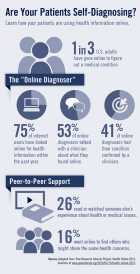Most adults in the United States seek health information online, and many report that these searches influence their health-related decisions. About two-thirds of people who obtain health information online begin their inquiries through popular search engines. “The potential problem with this approach is that patients may receive inaccurate or misleading results from these queries,” says Christopher A. Harle, PhD, MS. “This could lead patients to ignore important symptoms, delay seeking care, or refuse particular treatments.” Low-quality results could also lead patients to seek unnecessary care or use unproven or potentially harmful treatments on their own.
Are your patients self-diagnosing?

Click here to learn how your patients are using health information online.
Dr. Harle, Brent Kitchens, and Shengli Li conducted a study published in Decision Support Systems to investigate the quality of health information resulting from popular search engines. They queried Google’s general search engine using more than 2,000 different health-related terms. To assess quality on the first page of results, these sites were then checked to see if they were certified for accuracy by the Health On the Net Foundation or were referenced by Medline Plus, an NIH-run consumer website.
Good News, Bad News
According to the results, the majority of health information returned by popular search engines was of high quality, but quality levels varied across different health topic areas. Searches for terms relating to preventive health and social health issues tended to produce lower-quality results when compared with those relating to the diagnosis and treatment of physical diseases or injuries.
“Patients can find some high-quality health information when using popular search engines but should be aware that some topics—such as nutrition or fitness—can yield information that is potentially lower quality,” says Kitchens. Dr. Harle and Kitchens noted that the rankings of search engine results are important because users tend to gravitate to top-ranked results. Patients may be more likely to find misleading information if search engines rank lower-quality websites higher.
Implications for Physicians
The findings have important implications for patients, but also for policy makers, healthcare providers, and search engines. Dr. Harle suggests that existing online resources be examined for quality and that healthcare and government organizations step in and disseminate more high-quality information on topics where accurate information is lacking. “Healthcare providers should feel more confident that patients can find good health information on the internet,” he says. “However, they should consider helping patients find ways to identify high-quality information over questionable information. One strategy that may work is to be prepared with trusted websites to recommend to patients.”





